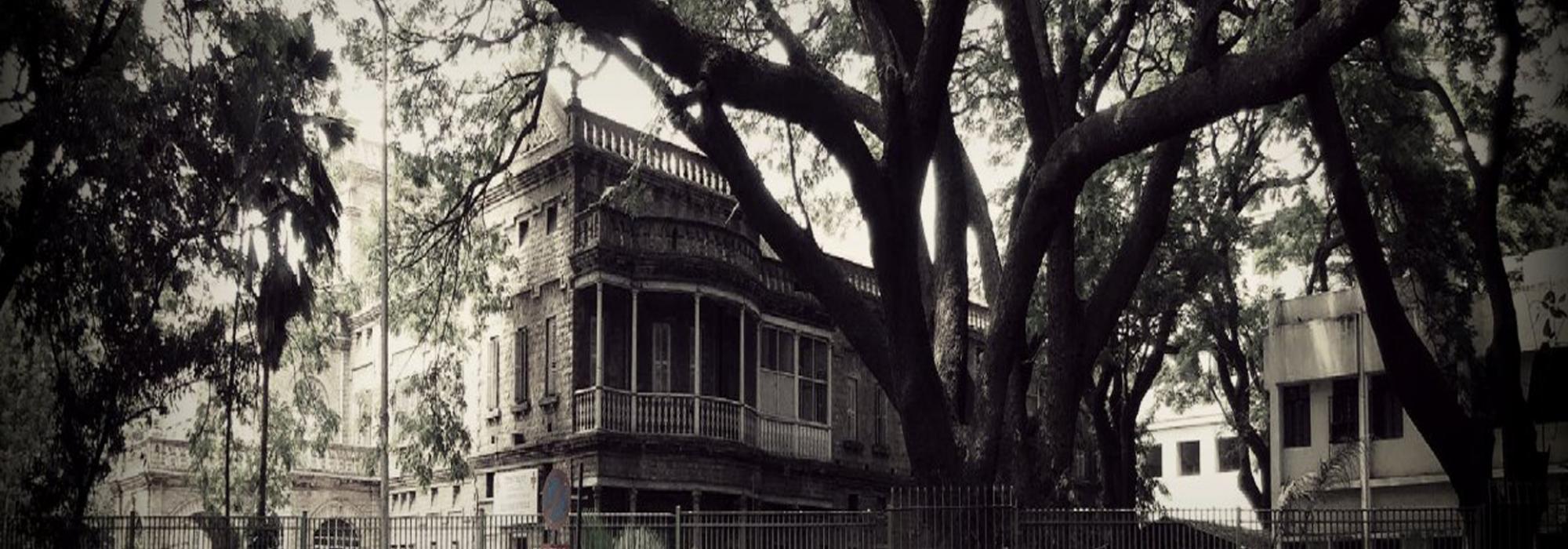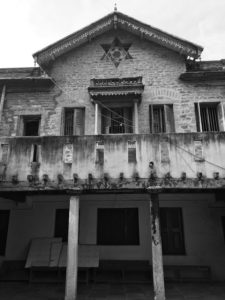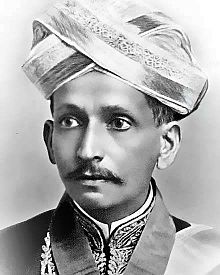When Nanjundaiah was in Shimoga, a teacher got transferred from there. He was a great scholar, highly civilised, and a tutor par excellence. He was loved and respected by all. The people of that town had organised a program to felicitate him and they invited Nanjundaiah also. He happily attended the event. The next day, one of his friends, who was also a judge there, asked Nanjundaiah, “I heard you had gone there?”
Nanjundaiah: “Yes. Why didn’t you come?”
Friend: “Should I come to such an event? That man has two wives – he married a second one while the first wife was still alive!” he said in an accusatory tone.
Nanjundaiah: “Oh, so your objection is to the fact that he has married and maintained two wives? Perhaps you would not have had any objections if he had not married but only maintained them!”
This was a smack to that friend; the reason being that everyone knew about the friend’s philandering ways.
Nanjundaiah always had a mild smile on his face. The movement of his lips and moustache into a mild smile often acted as a prologue to humorous incidents.
Once upon a time, during an assembly of the people’s representatives, one of the members had brought a suggestion for social reform. It was like this: “The social evil of child marriage has become rampant among our people. We need to prevent this. If a condition is imposed henceforth that while seeking for admission in schools and colleges, if the students are married, they would not be entitled to freeship and scholarship and such students would be liable to pay double the fee.”
Discussions and debate started on this topic. Diwan Vishveshwaraiah was impressed with the intention of this rule. He praised the Member thus: “It is truly encouraging to see that age-old people like you seek such reforms.” A few others remarked thus: “If this suggestion is followed, the father of the girl would be penalised.” Nanjundaiah said, “Why should we go to such an extent? Child marriage will stop if a rule is imposed that those who give their daughters in marriage to such boys shall be imprisoned for six months.” The water bubble burst and the members burst into laughter.
On another occasion, another enthusiastic member argued that for the purpose of maintaining orderliness of the village, Government should give authority to the Police. Nanjundaiah asked him, “Would you serve food to the policeman if he enters your kitchen to inspect if it is in order?”
On another occasion, a member described about the nuisance caused by mosquitoes in the village. Nanjundaiah asked him, “Are you asking the Government to get a mosquito net stitched for you?”
Once a member argued, “The Government should get gopuras constructed to all such temples in the province that do not have a gopura, as there is a prescription in the Śāstras that temples without gopuras should not be visited.” To that demand, Nanjudaiah asked, “Good, will it be alright if the sweet porridge prepared in such temples as prasāda is delivered to your house?”
In this manner, Nanjundaiah would show the foolishness of the people by the means of decent humour.
Nanjundaiah was a compassionate man. I do not know if he ever got angry. While he was a judge, he would show reasonable compassion to convicts. He would grieve with the words, “The wife and children have to bear the brunt of the wrong committed by him!” Sri. Navaratna Ramarao has given an example to illustrate this. When Nanjundaiah was the Councillor, the Government received a telegram from a place called Yedathore (a village in Heggadadevanakote Taluk, Mysore District). A notorious dacoit in that region, who had absconded and avoided the police for several years, was finally caught. He was tried, and after sentencing him, the Magistrate sent the telegram to the Government and mentioned thus: “Glad to report that so-and-so was hanged as sentenced.” As soon as Nanjundaiah read the telegram, he angrily remarked, “Glad! It seems he is glad! He is celebrating as though a son is born to him! Let them prepare sweet pudding and drink it!” This was the compassionate nature of Nanjundaiah.
I used to visit Nanjundaiah’s house every now and then. The manner in which I saw and understood the meaning of home, relatives, and family there, I have perhaps not experienced anywhere else. It was a huge building. There were children and elders in every nook and corner of the house. There would be some noise or incident that would occur every moment. Widows and old ladies could be seen moving freely everywhere. When I used to go upstairs, Nanjundaiah would say, “Sit, sit.” However, skirts and frocks of children, towels and undergarments, would be strewn all over the sofa. Because of that, I felt a little hesitant when I went there the first time. Observing that, he asked me, “Don’t you have children at home?” My hesitation disappeared. Many a times, when I used to visit him, I would see his wife standing next to him. Nanjundaiah would ask me to come in. I would hesitate and stand outside. He would say, “Come inside, it’s fine! Our home is just like all other homes, no exception,” and invite me inside. He was so simple and loving.
When he would work at home sitting at his desk, two children would have gone under the table and would be counting his toes or scratching or pinching his feet. Two others would stand on the chair and punch him repeatedly on his back. Another two would scream, “Appa, duddu!” Nanjundaiah would tolerate all this with a smile and ask them in Telugu, “Even for the sake of madness, what do you mean by ‘duddu?’ Madness!” It seems that ‘duddu’ was a rough derivative of the word ‘doodh,’ the Hindi word for ‘milk.’ Apparently, those children had learnt that word from the Muslim servants in the house. It took Nanjundaiah five minutes to enquire and understand this literary jargon. If one were to see his face at that time, one would know what real bliss meant.
Nanjundaiah was slow and steady by his very nature. He did not display urgency in anything. If he was informed that a mistake was committed, he would say, “Alright, so be it. We shall correct it.” If he was told that it cannot be corrected, he would say, “If that cannot be done, then, let it be so; what have we missed?” If he was to be then told that we missed something, he would quip, “Then what is the point of worrying? Let’s endure it.”
Once when he was travelling to Delhi, he had the thought of getting down near Nasik and taking bath in the Godavari river. He told his secretary about the same. He agreed that it could be arranged and when the train neared Nasik, he woke up Nanjundaiah. It was around 5 a.m. Nanjundaiah said, “It is so cold right now. If I get off the train now, it would only result in a curse to God. Let us take a bath while returning after I have committed some sins in Delhi.” While returning, when the secretary woke him near Nasik, he said, “I did not commit such a sin! Why to suffer here tonight?” Usually, it would be surprising to everyone if Nanjundaiah was on time whether to catch the train or to a meeting.
Nanjundaiah was an equestrian. It is said that he would travel long distances on horse. But as far as I have seen, he would go to his brother’s house which was opposite to his house—a stone’s throw away—and while being astride, he’d go near the portico and talk to the women and children for half an hour or just look around here and there before returning home. Many a times this would be his horse ride. On some days, he would ride till the Attaara Kacheri[1]. Such a ride was during on duty.
I also have something to say about Nanjundaiah’s style of work. For several weeks he would be engrossed in reading books and external administration. If he came to know that the files that have piled up have exceeded fifty or hundred, he’d go to his office early in the morning on his horse. It was enough if there was just a peon to open the door. He did not require clerks or assistants. He would work alone till twelve or one in the afternoon. He was thorough with all the laws, administration, and the nature of business of all departments, so he never expected anyone to assist him. Opening every file and quickly glancing at the important points therein were easy for him. As soon as he finished reading, he wrote the judgment with clarity and without room for any doubts. He did not require typists or stenographers. He could write with great speed. Due to that, files that had piled up for one or two months would get disposed off within a matter of a day or two.
I have already given an instance about his compassionate nature. Once, the Government had received several allegations against a Munsiff. A few government officials showed hostility towards that Munsiff due to personal animosity. These adversaries were interested in getting that Munsiff punished. Whenever that letter came before Nanjundaiah, he would write, “Provide the reply given by the Munsiff to the show cause notice.” Finally, he wrote thus: “Even a person accused with murder cannot be punished without following the due process of law and after a detailed trial. However, it appears that this poor Munsiff would be deprived of that opportunity.”
When he was in the High Court, he would try to find reasons to at least reduce the term of sentence if the accused could not be acquitted. He would either reduce the sentence to six months instead of a year or grant simple imprisonment instead of rigorous imprisonment, and in civil cases he would dispense with payment of court fees and somehow try to provide some sort of concession to the aggrieved. He did not cause harm to any one at any point of time during his official tenure.
An objection that was raised against Nanjundaiah was that of favouritism. However, I don’t know what the basis for such an allegation is. This allegation is quite common in our nation and is levelled by everyone against everyone. To my knowledge, there has been no incident where Nanjundaiah caused injustice to someone for the sake of helping his near and dear ones. There may be one or two instances where a few people may have received more than what they deserved; and there are several reasons for that. However, one cannot jump to the conclusion that the only reason for the said concession was his favouritism. In conclusion, it can be said that Nanjundaiah never had so many opportunities. The concessions or opportunities that may be shown by a Councillor or Judge would usually be minor. However, I have not seen anyone rising to a high post under the patronage of Nanjundaiah.
The appointments made by H V Nanjundaiah in the Mysore University are decisive proof that he only favoured merit. Radhakrishnan, Radhakumud Mukherjee, K T Shah, A R Wadia, M Hiriyanna, Sampathkumaran, Venkateshachar, C R Narayan Rao, Sampath Iyengar, N S Subba Rao – none were his “own men.” All of them belonged to castes or communities other than that of Nanjundaiah and all of them had already gained recognition for their respective areas of practice and subjects at the time of their appointment. If the Mysore University has earned the high status and reputation that it enjoys today, the aforementioned scholars are the reason behind it. The credit for selecting and appointing these great scholars should go to Nanjundaiah.
H V Nanjundaiah and Sir M Vishveshwaraiah were friends. They both belonged to the same sub-caste. However, their points of view were different. It can be said that Vishveshwaraiah seemed to be in a great hurry when it came to progress and development. Nanjundaiah was not insouciant about development and progress, but he did not seem to have any urgency. Urgency, in present context, refers to the speed that exceeds our capacity and the existing circumstances. It was Nanjundaiah’s desire that the speed should be proportionately reduced to be consummate with the existing condition of our nation. Vishveshwaraiah had the intention to build the nation in the blink of an eye like the mythical architect Maya [who built Indraprastha for the Pāṇḍavas in a flash]. Nanjundaiah opined differently. He felt that ours is not paradise; the wall has to be built by laying brick upon brick, mortar upon mortar, and weighing each and every step. Vishveshwaraiah would not think twice before raising a loan on behalf of the state. Nanjundaiah was apprehensive of the liability created by debt. The striking quality of Vishveshwaraiah was courage. The striking quality of Nanjundaiah was fear of danger. Due to this, the two were not compatible in a few matters. Their difference in views, however, never came in the way of their friendship. Vishveshwaraiah respected and greatly admired the erudition, sincerity, and the dedication towards progress of the nation of Nanjundaiah and showed him high respect on all occasions.
Sometime in 1920, Nanjundaiah was bed-ridden due to ill health. A few officers of the University visited him. Nanjundaiah asked them, “What is the news of the hour? I haven’t read the newspaper for past three to four days!”
One of them said, “Shaukat Ali has gotten infuriated. Apparently, he will leave for Afghanistan if Indians do not agree to go on war in support of Khilafat!”
On hearing this, Nanjundaiah rose partially from his bed and said, “Is he going to leave? What is the point of stopping someone when they have made up their mind to leave? Let him go. Does he require any money for that? Let’s raise funds and give it to him!”
Nanjundaiah was courageous. He would never be scared of anyone while clearly conveying what his conscience believed to be correct. Deep analysis of all the possible questions on a given circumstance was his basic nature. He had assumed it as a duty to show that every question has two or three facets. Nanjundaiah would raise objection to the arguments advanced by the lawyer for his party. Similarly, he would object to a point of contention raised by the other party’s advocate too. The lawyers would be bewildered by this. Nanjundaiah would get quite excited in crushing the stubbornness of any advocate who tried to defend his case vehemently. Weighing the pros and cons was the special quality of Nanjundaiah, which he exhibited not only while discharging judicial functions but in all other areas. He was deeply interested in social reforms. He was of the opinion that our religious institutions need to be reformed. Accordingly, he caused enactment of laws for the purpose of reformation of the administration of temples and maṭhas. Yet he was not someone who had renounced faith. He would appear to be a traditionalist to those who were progressive and would appear progressive to those who were traditionalists. His multifaceted vision of various aspects, and maintaining a balance for each of those aspects, was the crux of his approach. His ideology was this: the restrictions in the State, society, and infrastructure need to be relaxed in such a way that they should not lead to the disintegration of the system. There should be freedom but with reasonable restrictions. This kind of mental disposition is what is called as “liberalism.” The crux of this ideology is that all human questions are two-faced; if even one among the two is rejected, it would lead to destruction. There should be development, but it should be achieved in an organised manner. There should be progress but not so quick that we lose track of our minds. This was the belief system of Nanjundaiah.
Nanjundaiah was the brain trust for the Mysore Party. D Venkataramayya, M Venkatakrishnaiah, and H V Nanjundaiah, all of them worked in three different ways in three different bodies to achieve the same goal. They were bosom friends and none of them did anything without the advice and consultation of the other two.
Concluded.
This is the second part of an English translation of the fifth chapter of D V Gundappa’s Jnapakachitrashaale – Vol. 1 – Sahiti Sajjana Sarvajanikaru. DVG wrote this series in the early 1950s. Thanks to Kashyap N Naik for his review. Edited by Hari Ravikumar.
Footnote
[1] Attara means ‘eighteen’ in Hindi while Kacheri is an Urdu word for ‘office.’ Attara Kacheri was the name given to the government secretariat with eighteen departments.














































